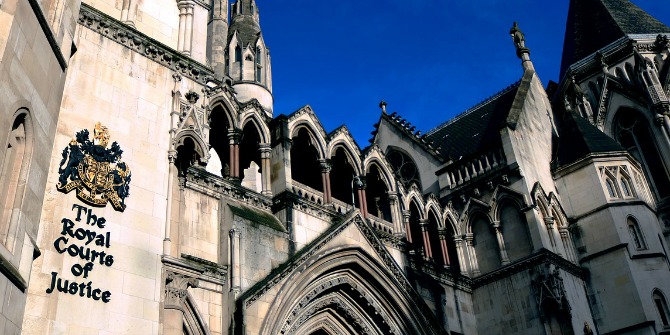Promising new proposals to reform and strengthen UK intergovernmental relationships were set out in January 2022. One year on, Johanna Schnabel and Paul Anderson discuss how effective these reforms have proven so far, taking stock of the progress that has been made and identifying the areas where there is more to be done.
The constitutional showdown sparked by the Scottish Parliament’s Gender Recognition Reform Bill earlier this year is one of several examples showing the delicate and strained relationship between the UK and devolved governments. In January 2022, new intergovernmental structures were created to enhance intergovernmental relations, presenting an opportunity to formalise and forge more stable and closer intergovernmental relationships through regular interaction and, notably, a dispute resolution mechanism.
Tensions such as those about Scotland’s gender recognition legislation could have been resolved through the newly created “Prime Minister and Heads of Devolved Governments Council” and its accompanying interministerial bodies, thus avoiding escalation to the Supreme Court. One year after the reform, several of the new bodies have taken up their work. As the tensions concerning Scottish gender legislation show, however, work remains to establish strong, constructive and cooperative relations between the different governments.
Have the new structures encouraged closer cooperation?
The main purpose of the new structures was to promote closer cooperation between governments. The number of meetings held since the inauguration of the new structures shows that the new formats do not just exist on paper. The Interministerial Standing Committee (IMSC) and the Finance Interministerial Standing Committee (F:ISC) have met three times since January 2022. Each meeting was chaired by a different government, with F:ISC meetings in June 2022 and February 2023 taking place in Cardiff and Edinburgh. Rotating chairs and locations are a welcome advancement in UK intergovernmental relations (IGR), fostering a less hierarchical approach to intergovernmental interaction.
The Prime Minister and Heads of Devolved Governments Council (known as the IGR Council) held its annual meeting in November 2022, chaired by Rishi Sunak after taking office, to discuss inflation, the NHS and the cost-of-living crisis. Except for the IGR Council, most bodies met less frequently than their terms of reference require – though the monthly schedule for portfolio minister meetings was perhaps overambitious and unrealistic. Those may be teething issues rather than a sign that the new forums have become defunct right after creation – new structures take a while to be properly up and running.
It is notable, though, that most meetings occurred in the first half of 2022, with meetings being less frequent in the second half. The Tory leadership issues in summer and autumn may have played a role. It may be the reason, much to the chagrin of the devolved governments, why several meetings were cancelled or postponed, including a meeting of the IGR Council to discuss the cost-of-living crisis, requested by former Scottish First Minister Nicola Sturgeon, as well as meetings of the IMSC and F:ISC.
A common critique of intergovernmental relations in the UK was that they serve as forums for knowledge exchange rather than allowing the devolved governments to influence UK government policy. Meetings of the new structures concerned high-stakes political issues such as inflation, the war in Ukraine, social inequalities and healthcare, and discussion on how governments could work together to tackle shared issues. In addition, the devolved governments have used the meetings to urge the UK government to do more on pressing issues, such as the cost-of-living crisis. It is unclear whether there was more than information exchange, however. Communiqués refer to discussions, but there is no evidence of actual cooperation. The mood music, however, has been somewhat positive. At November’s IGR Council, the Scottish first minister welcomed regular interaction between the four governments of the UK and believed “we’re entering a phase that will be more constructive and positive”.
Where next for intergovernmental relations in the UK?
The review of intergovernmental relations published in January 2022 recommended a preliminary number of 22 bodies to replace the largely ineffective Joint Ministerial Committee system. Of those proposed forums, 11 have been established, including the aforementioned top-tier body, the IGR Council, and the two middle-tier forums, IMSC and F:ISC.
Several third-tier portfolio forums such as an Education IMG and an Environment, Food and Rural Affairs IMG have also taken up their work. All of them adopted terms of reference, making the new structures more institutionalised than previous arrangements, with more regular interaction. The Environment IMG, for instance, met six times between January 2022 and February 2023, though most other IMGs have met only once or twice. Joint communiqués and, in some cases, minutes are published on the UK and devolved government’s websites, fostering greater transparency and public scrutiny. As we have argued before, more detailed reporting on the substance of intergovernmental meetings would further enhance transparency, while reinforcing the significance of interaction between the governments.
More regular intergovernmental interaction would allow governments to discuss legislative priorities, share experiences, and learn from each other.
There is, therefore, room for improvement. Several IGR bodies still only exist on paper. Notably, no bodies seem to have been established in core areas such as health, transport and justice. While these areas are largely devolved, more regular intergovernmental interaction would allow governments to discuss legislative priorities, share experiences, and learn from each other. Commitment by the UK government to use IGR to involve the devolved governments in early stages of policy development when legislative matters concern devolved competences would also be a welcome step towards more cooperative and constructive interactions.
The absence of meetings over the summer and early autumn of 2022 for the IMSC and F:ISC bodies signals the omnipotent role still played by the UK government in organising IGR. More effort is required on the part of the UK government to see these meetings as constitutionally and politically important and not merely a tick-box exercise. During her short-tenure as Prime Minister, Liz Truss made no contact with the devolved first ministers, and even suggested the best strategy for managing relations between the UK and Scottish governments was to ignore the Scottish First Minister. Fortunately, Rishi Sunak has taken a more constructive approach.
A missing piece in the new IGR structures is England. While the UK government is also the government of England, the inclusion of metro mayors in IGR structures seems a sensible way forward to further develop and entrench devolution in England. The powers of metro mayors vary, but there are competence similarities with the devolved governments (e.g., public transport). Including metro mayors in relevant IMGs would not only further enhance intergovernmental interaction in the UK, but would likewise enhance the policy learning element of political decentralisation.
Finally, better use of the dispute resolution mechanism could prevent jurisdictional conflicts from turning into a constitutional crisis. The mechanism seems to have been used only once, by the Northern Irish government, though what the outcome of the dispute process was remains unclear.
At a time when British devolution faces many challenges, strong and reliable intergovernmental bodies are as crucial as ever to make devolution work. Indeed, former Prime Minister Gordon Brown highlighted the need to act on economic and social challenges in a cooperative manner, requiring “institutions that encourage and facilitate cooperation between the different tiers of government”. His proposed solution consists of the establishment of a Council of the Nations and Regions. Rather than establishing a new body, the way ahead is to turn the Prime Minister and Heads of Devolved Governments Council into a functional and meaningful venue for intergovernmental cooperation and expand it to include local government in England. The future of the Union may depend on it.
All articles posted on this blog give the views of the author(s), and not the position of LSE British Politics and Policy, nor of the London School of Economics and Political Science.
Image credit: Number 10, Attribution-NonCommercial-NoDerivs 2.0 Generic (CC BY-NC-ND 2.0)






